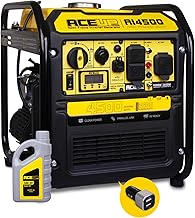Selecting the Appropriate Generator Size for a 200-Amp Service
How to Clean a Generator Carburetor: A Step-by-Step Guide
April 19, 2025Smallest Portable Generators: Compact Power Solutions for Any Need
April 19, 2025Ensuring uninterrupted power during outages is crucial for both residential and commercial properties. For those with a 200-amp electrical service, choosing the right generator size is essential to meet your power needs effectively. This article provides a comprehensive guide to help you determine the appropriate generator size for a 200-amp service, along with top generator recommendations.

Understanding 200-Amp Service and Power Requirements
A 200-amp service is common in modern homes and commercial buildings, providing a substantial amount of electrical capacity to support various appliances and systems. To determine the suitable generator size, it’s important to calculate the total wattage your property consumes.
Calculating Total Wattage
- List Essential Appliances and Systems: Identify all devices you intend to power during an outage, such as HVAC systems, refrigerators, lighting, and electronics.
- Determine Starting and Running Wattages: Appliances have two wattage requirements:
- Running (Rated) Wattage: The continuous power needed to keep the appliance operating.
- Starting (Surge) Wattage: The extra power required to start the appliance, typically higher than the running wattage.
- Calculate Total Wattage: Add up the running wattages of all essential devices. Then, identify the highest starting wattage among them and add this to the total running wattage to determine the peak load.
Example Calculation
| Appliance | Running Wattage (W) | Starting Wattage (W) |
| Refrigerator | 800 | 1200 |
| Central AC | 3500 | 7000 |
| Lighting | 500 | 0 |
| Television | 200 | 0 |
| Total | 5000 | 8200 |
In this example, the total running wattage is 5000W, and the highest starting wattage is 7000W (from the Central AC). Therefore, the generator should handle at least 12,000W (5000W + 7000W) to accommodate the initial surge when all appliances start simultaneously.
Recommended Generator Size for 200-Amp Service
Considering the calculations and the need for a safety margin, a generator with a capacity between 15,000 to 20,000 watts (15-20 kW) is typically suitable for a 200-amp service. This range ensures that the generator can handle the starting surges of multiple appliances and provide continuous power without overloading.
Top Generator Recommendations for 200-Amp Service
Here are some reliable generators that align with the power requirements of a 200-amp service:
1. Generac Guardian 26kW Standby Generator
- Power Output: 26,000 watts
- Fuel Type: Natural Gas or Propane
- Features: Automatic transfer switch, mobile monitoring, and durable enclosure.
- Pros: High power output suitable for large homes; seamless automatic operation.
- Cons: Requires professional installation; higher upfront cost.
2. Westinghouse WGen12000DF Dual Fuel Portable Generator
- Power Output: 12,000 running watts; 15,000 peak watts
- Fuel Type: Gasoline or Propane
- Features: Electric start, multiple outlets, and portability.
- Pros: Dual-fuel capability; portable design.
- Cons: Manual operation; lower power output compared to standby generators.
3. Champion 12.5kW Home Standby Generator
- Power Output: 12,500 watts
- Fuel Type: Natural Gas or Propane
- Features: Automatic transfer switch, 24V starting system, and weather-resistant enclosure.
- Pros: Compact design; reliable performance.
- Cons: Slightly lower power output; professional installation required.
Factors to Consider When Choosing a Generator
- Fuel Availability: Ensure a steady supply of the chosen fuel type (natural gas, propane, or gasoline) in your area.
- Installation: Standby generators require professional installation, while portable generators may need manual setup during outages.
- Budget: Consider both the initial investment and long-term maintenance costs.
- Noise Levels: Check the generator’s noise output, especially if it’s installed near living areas.
Selecting the right generator size for a 200-amp service involves careful assessment of your property’s power requirements and understanding the starting and running wattages of essential appliances. A generator within the 15,000 to 20,000-watt range is generally appropriate, but it’s advisable to consult with a professional electrician to perform a detailed load analysis tailored to your specific needs. Investing in a suitable generator ensures that your home or business remains powered seamlessly during unexpected outages.
